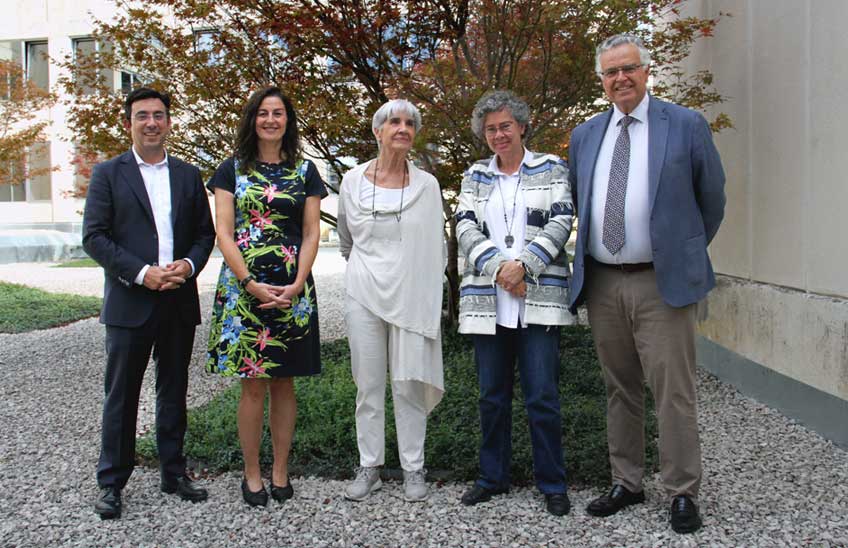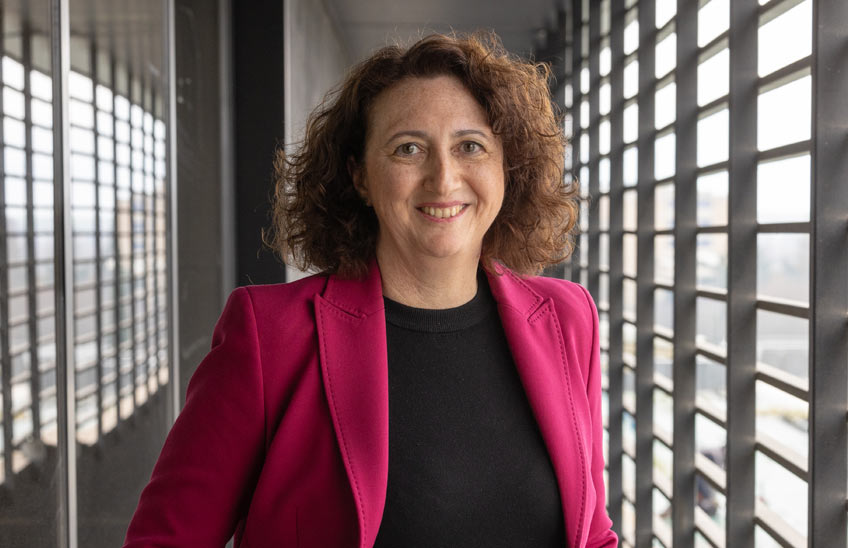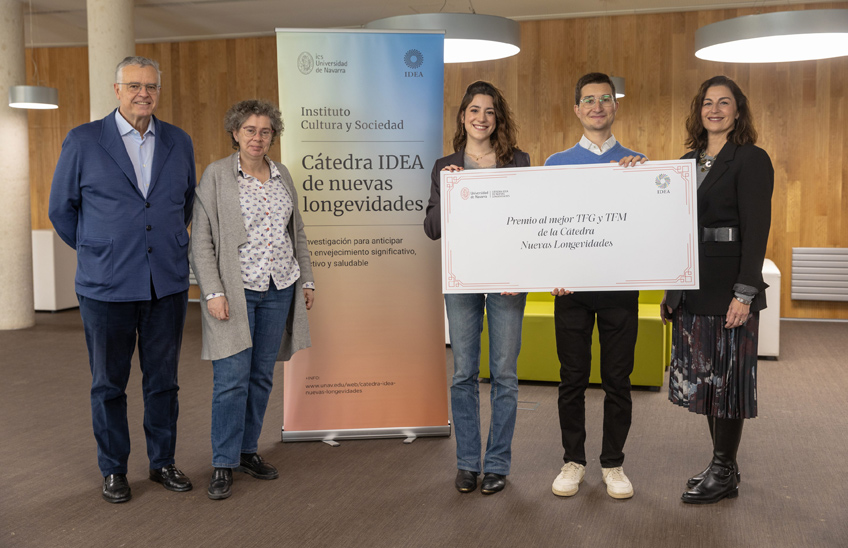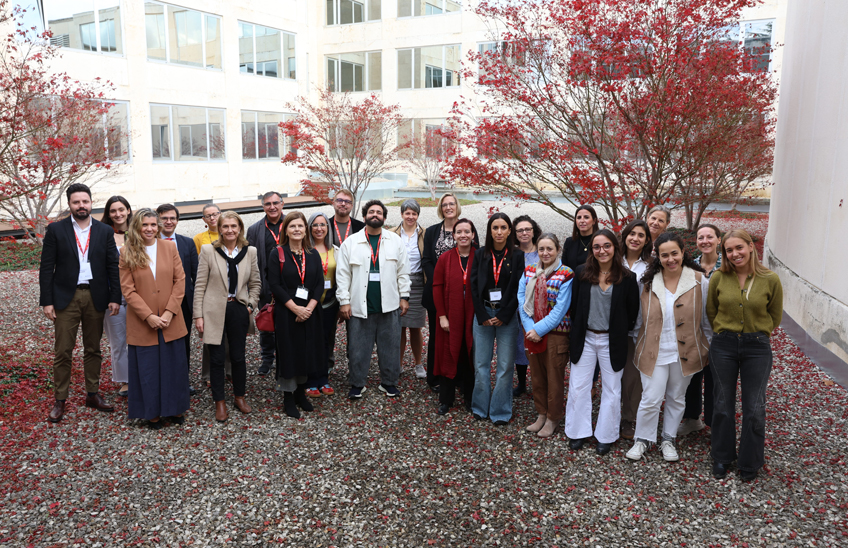Interdisciplinary experts support self-care, meaningful aging and intergenerational dialogue in the face of longevity challenge
Academics and specialists in Geriatrics intervened in the opening ceremony of the Chair IDEA of New Longevities at the Institute for Culture and Society

FotoIsabel Solana<br>/Antonio Moreno, Carolina Montoro, Camino Oslé, Ana Marta González y Rafael Sánchez-Ostiz, participantes en la jornada.
02 | 10 | 2023
Longevity as a social opportunity' has focused a workshop of the University of Navarra and IDEA Foundation. The activity has been organized as an act of presentation of the Chair IDEA of New Longevities, which has started its activity this academic year at the Institute for Culture and Society (ICS).
The first speaker at the event was Ana Marta González, director of Chair, professor of Philosophy at the University of Navarra and member of the Pontifical Academy of Social Sciences, who spoke about the challenge social impact of the increase in life expectancy.
The professor insisted that this age group "is not the past, but the future", and questioned "whether we are culturally and socially prepared to face it". From the first point of view, she stressed that "we drag inertia and prejudices" in the way we face this stage of life. "Many times they crystallize in different forms of 'ageism' that only critical reflection, informed by the data of the sciences, puts us in a position to overcome," he pointed out.
With regard to social challenges, he recalled that one of the most pressing is care. He mentioned that projections made in 2021 estimate that the European population in need of long-term care will increase from 30.8 million in 2019 to some 38.1 million in 2050, figures that can also be related to the forecast increase of the social expense : from 1.7% of GDP in 2019 to 2.5% in 2050. "The European Care Strategy, presented last year, seeks to respond to this reality," he pointed out.
However, she emphasized that this new status not only has economic implications that will have to be taken into account in order to make adjustments to the current model , but also human ones, especially with regard to the professionalization of care. Thus, he called for "a social model that, by placing people at the center, ensures the reciprocal reinforcement of the productive system and the care system".
This was followed by the roundtable 'Challenges and opportunities of an aging society', with the participation of Rafael Sanchez-Ostiz: Geriatrician, director general of IDEA and president of association Navarra de Entidades Asistenciales (ANEA); Carolina Montoro, professor of Geography of the School of Philosophy and Letters; Antonio Moreno, Full Professor in Economics and Dean of the School of Economics; and Camino Oslé, vice-president in the board directive of the Casa de la Misericordia.
A Chair to unite thinking and doing
Rafael Sánchez-Ostiz stressed that the purpose of the Chair IDEA of New Longevities is to "unite thinking and doing" and that its four lines of action are the generation of knowledge, through research, teaching and awareness raising; innovation, through initiatives such as Living Lab or the intergenerational space 'Nest'; the training of people and the project 'Colibrí'; and cooperation to development, through projects in countries such as Cuba or Venezuela.
He also reflected on the need for promote accessible and quality healthcare for the elderly and on the recognition of the culture of care, which includes the qualification and recruitment of professionals dedicated to this field.
For her part, Carolina Montoro indicated that Western societies are aging not only because of the increase in life expectancy, but also in their instructions, since there are fewer and fewer births. According to the expert, agreement , the challenge is to maintain intergenerational justice, since the reduction in the size of families implies a reduction in informal care resources, which puts more pressure on formal resources.
As solutions, he has proposed delaying the retirement age, implementing policies that protect families and migrants, promoting healthy care and active aging, and encouraging cities that are friendly to the elderly by removing urban barriers and increasing participation.
Antonio Moreno emphasized the need to "humanize Economics", so as to shift the focus from economic growth - wealth generation - to equity and justice - social cohesion.
According to Dean of the School of Economics, demographic, economic and social issues are currently converging in political agendas, given the forecast increase in the demand for care in the service sector. He encouraged reflection on the opportunities that are opening up from this point of view to generate new jobs and to promote the partnership between the public and private sectors. He also indicated that in the field of Education there are challenges such as educating the intergenerational view and creating new programs for training.
Finally, Camino Oslé pointed out that growing old "is a gift", since it allows one to enjoy family and friendship more, "but it is also hard", since not all people are in a position to live well until the end of their days. He reminded that one can age well, when one maintains sufficient functional capacity and enjoys family and friendship; or badly, when one falls into dependence. To achieve the former, he has opted for prevention, both in terms of self-care and in terms of preparing oneself for retirement throughout one's life.
Along these lines, he stressed that to enjoy a good life, in addition to health, money and love - "as the bolero says"- there is another factor: to have a script to continue being in the world and to strive to be the best version of oneself.
Related news: Reportaje Hacia un envejecimiento significativo, Nuestro Tiempo magazine.



